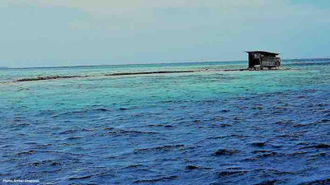For true change, 'we need new relationships' with ocean, God's creation

A disappearing atoll between the island of Taha'a and Rai'atea, Leeward Islands, French Polynesia. Photo Arthur Chapman
The key to caring for God's creation isn't more innovative solutions that will emerge from this week's United Nations Ocean Conference, nor is it a new set of targets that could come out of vital UN conferences later this year. Rather, to truly care for our common home, we all need to feel connected to God's creation and each other, speakers from throughout Oceania shared in an unofficial side event to the UN Ocean Conference on Tuesday.
The event, titled 'Oceania Talanoa: Faith, Indigenous, and Nature's Moana Shaping and Safeguarding Innovations of the Sea,' was broadcast live from Lisbon, Portugal, the host city of the conference. The dialogue brought together Catholic leaders and Indigenous Peoples from throughout Oceania to share how they connect with the ocean and God's creation, and how Catholics everywhere can "shake up" the status quo.
Fr Pedro Walpole, SJ, Global Coordinator for Ecojesuit, Research Director for the Environmental Science for Social Change, and Network Coordinator for the River Above Asia Oceania Ecclesial Network, said: "If we don't feel it here [in the heart], it doesn't matter how much, how little we have in our pocket. We're not going to change. The change, as we keep hearing from the youth today, must be now, not 30 years from now. We need a change now."
Fr Walpole explained that the health of oceans is critical to the health of all species, especially human beings, therefore all of us must care for it. Oceans generate 50 percent of the oxygen we breathe, and they absorb 25 percent of all carbon dioxide emissions, according to the UN. Almost 2.4 billion people live within 60 miles of the coast.
But oceans are suffering. A warmer planet is causing sea levels to rise, and humans dump about eight million metric tons of plastic into the ocean every year. This plastic is suffocating coral reefs and endangering the thousands of species that make up that ecosystem.
"We need new relationships, but unless consumers connect with that reality, we're sunk," Fr Walpole said.
Archbishop Peter Loy Chong of the Archdiocese of Suva, Fiji, deepened participants' understanding of the "ecological conversion" needed. He quoted Pope John Paul II, Pope Benedict XVI, and Pope Francis. All three Popes shared the same urgent concern for the destruction of God's creation.
Pope Benedict XVI said: "The external deserts in the world are growing, because the internal deserts have become so vast." In Laudato Si', Pope Francis echoes Pope John Paul II and invites everyone to undergo an "'ecological conversion,' whereby the effects of their encounter with Jesus Christ become evident in their relationship with the world around them."
Archbishop Chong, current President of the Federation of Catholic Bishops Conferences of Oceania, said: "What is the language that reaches the heart of people and the heart brings about change? Because change begins with the heart. If there is a language that can reach the heart, then you can see change that will go up to your mind."
Other speakers shared emotional testimonials about how their lives have been shaped by a thriving ocean. Theresa Ardler, Research Indigenous Liaison Officer at Australian Catholic University, grew up in an Aboriginal fishing community. "It's actually quite beautiful to still have that strong connection with the ocean, and I'm very proud. It's very much in my heart," she said.
Pelenatita Kara, Program Manager with the Civil Society Forum of Tonga, described what it's like to have a personal relationship with God's creation. The ocean is the last thing she hears before bed and the first thing she hears in the morning. "We know when it's moody. Close to the cyclone season, you can hear the sea rolling," she said.
Tevita Naikasowalu, Coordinator for Justice, Peace and Integrity of Creation for the Columban Mission Society in Fiji, compared the ocean to a mother caring for her children. His entire island is surrounded by the ocean. "Whatever we need is from the ocean," he said. "It can really speak to you if you will learn to listen."
Sister Dr Robyn Reynolds, OLSH, Senior Lecturer at Yarra Theological Union, called to mind Genesis 1:2: "Now the earth was formless and empty, darkness was over the surface of the deep, and the Spirit of God was hovering over the waters."
Sister Dr Reynolds said: "I just like to remember that and think that, in cooperation with the divine spirit breathing over the waters, that's our task, our privilege, our opportunity. Not only in a contemplative way, to breathe over the waters; but in a practical, daily way, to find ways with our families, our communities, our churches, to bring new life to our oceans."
The event was moderated by Amy Woolam Echeverria, International Director of Justice, Peace, and Integrity of Creation for Columban Missionaries and Co-coordinator of the Ecology Taskforce of the Vatican Covid-19 Commission.
LINKS
Watch:
Faith, Indigenous, and Nature's Moana Shaping and Safeguarding Innovations of the Sea: www.youtube.com/watch?v=UsXMBNUtZZQ&t=1509s
In a first, Oceania Catholic groups unite to advocate at UN Conference: https://laudatosimovement.org/news/in-a-first-oceania-catholic-groups-unite-to-advocate-at-un-ocean-conference/


















